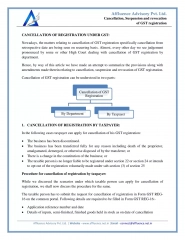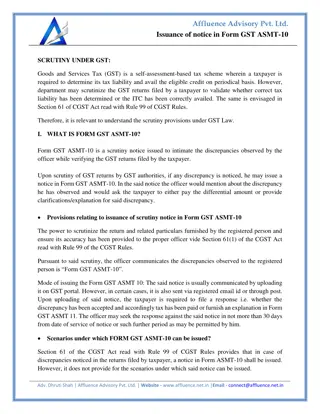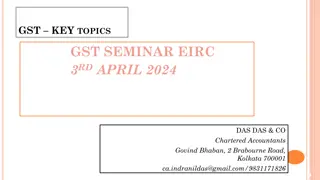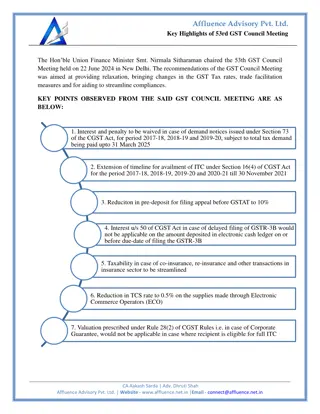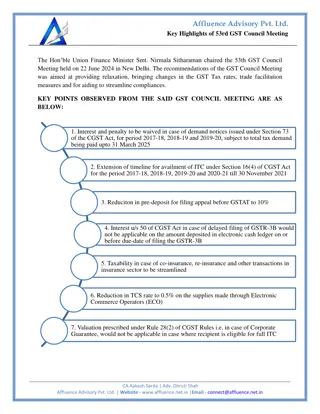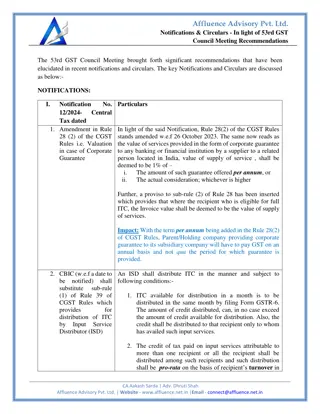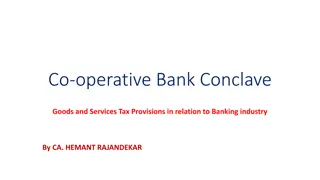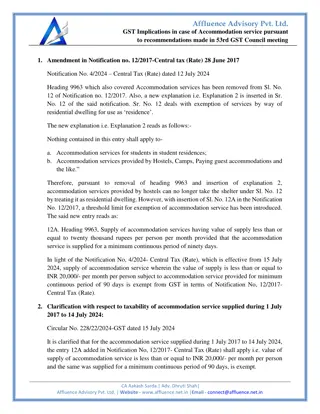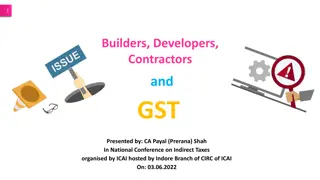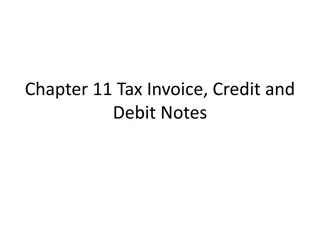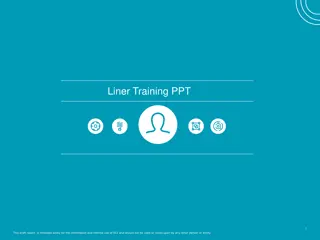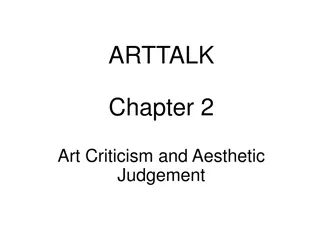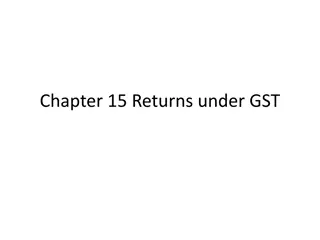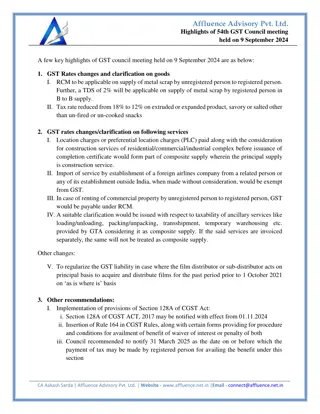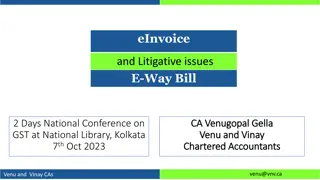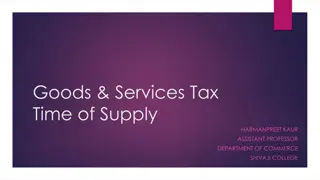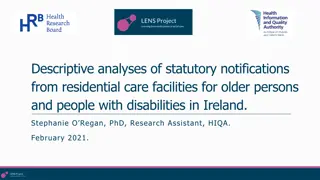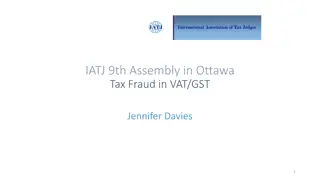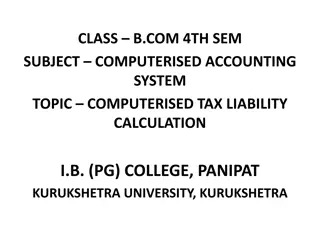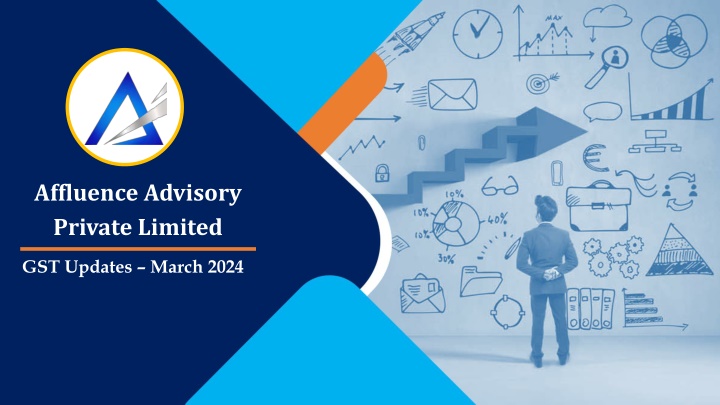
March 2024- Latest GST Notifications and Judgement
In the latest edition of u201cGST Update and Judgements: March 2024,u201d we will delve into the most recent developments in Goods and Services Tax (GST) regulations and legal interpretations. In this comprehensive update, we bring insights into the key GST amendments and noteworthy judicial decisions. Stay informed of the latest changes and judgments shaping the GST landscape in March 2024.
Download Presentation

Please find below an Image/Link to download the presentation.
The content on the website is provided AS IS for your information and personal use only. It may not be sold, licensed, or shared on other websites without obtaining consent from the author. If you encounter any issues during the download, it is possible that the publisher has removed the file from their server.
You are allowed to download the files provided on this website for personal or commercial use, subject to the condition that they are used lawfully. All files are the property of their respective owners.
The content on the website is provided AS IS for your information and personal use only. It may not be sold, licensed, or shared on other websites without obtaining consent from the author.
E N D
Presentation Transcript
Affluence Advisory Private Limited GST Updates March 2024
INDEX News & Updates Section A Instruction No. 01/2023-24-GST (Inv.) dated 30/03/2024 1. Advisory dated 8 March 2024 issued by GSTN 2. Advisory dated 12 March 2024 issued by GSTN 3. Update: Stay ordered by the HC s in the matter concerning corporate guarantee - 4. 3.1 Sterlite Power Transmission Ltd. Delhi High Court 3.2 GVK Power & Infra Ltd. Telangana High Court Section B Summary of Case Laws Colourable exercise of power by authority Calcutta High Court 1. Amount recovered involuntarily from the Petitioner Delhi High Court 2. Petitioner was denied extension to file response to SCN Calcutta High Court 3. Violation of Section 83(1) read with Rule 159 Telangana High Court 4. Non-consideration of reply submitted by the petitioner - Delhi High Court 5. Principle of uberrima fides i.e. utmost good faith Allahabad High Court 6. Violation of Principles of Natural justice Jharkhand High Court 7. Parallel proceedings under Section 6(2) of the CGST Act Gauhati High Court 8. Refund of service tax paid pursuant to DGCEI proceedings not available CESTAT Ahmedabad 9. GST applicability on Canteen facility, insurance premium, transport facility etc. Tamil Nadu AAAR Ruling 10. Whether Hostels being residential dwellings are exempted from GST Madras High Court 11. Doctrine of consistency unveiled - Allahabad High Court 12. Difference between GSTR3B and GSTR-2A Madras High Court 13. Invocation of Section 122(1A) and Section 137 against unregistered person Bombay High Court 14
GST - NEWS & UPDATES Instruction No. 01/2023-24-GST (Inv.) dated 30 March 2024 The GST legislative framework has undergone various amendments and refinements based on the feedback from businesses and the evolving economic scenarios. The advent of Instruction No. 01/2023-24-GST (Inv) issued by CBIC on 30 March 2024 is one such refinement to streamline procedures and uphold compliance standards while mainlining the Governments objective of ensuring ease of doing business for taxpayers. The captioned Instruction provides guidelines for CGST filed formations to maintain a uniform procedure in undertaking enforcement activities, with or involving regular taxpayers while ensuring adherence to legal provisions and promoting ease of doing business. The highlights of the said Instruction are listed as below:- The (Pr.) Commissioner shall be responsible for the development and approval of any investigation which falls within his jurisdictional limits and if any information or intelligence is pertaining to another GST field formation, then the same shall be forwarded by the (Pr.) Commissioner to the concerned CGST field formation or DGGI, as the case may be. The approval of the (Pr.) Commissioner is mandatory for each investigation except in the following cases wherein the prior written approval of the zonal (Pr.) Chief Commissioner shall be required:- i. Matters of interpretation seeking to levy tax/ duty on any sector/commodity/ service for the first time, whether in Central Excise or GST; or Big industrial house and major multinational corporations; or Sensitive matters or matters with national implications; or Matters which are already before GST Council ii. iii. iv.
GST - NEWS & UPDATES In the above cases, the CGST field formation shall be required to collect details regarding the prevalent trade practises and nature of transactions carried out from the stakeholders. Further, the officer will have to evaluate the implications/impact of such matter to justify the initiation of said investigation and action. It has to be ascertained whether any inquiry has already been initiated on same subject matter with respect to the same taxpayer/GSTIN for the purpose of obtaining approval to initiate fresh investigation. The said fact shall be bought to the notice of approving authority. In case where DGGI or State department is simultaneously undertaking record-based investigation of the same taxpayer on different subject matters. In the said case, (Pr.) Commissioner will have to engage in a dialogue with other investigation office(s) to analyse the feasibility of only one of the offices to continue with all the subject matters relating the taxpayer and the other office consolidating their material. If the same is not feasible, the reason for the same shall be confirmed on file by (Pr.) Commissioner. There could be a case where (Pr.) Commissioner has initiated an investigation with respect to a GSTIN in its jurisdiction, and the issue is relevant to some or all GSTIN of that taxpayer (under the same PAN). If the matter falls within charter of DGGI and is not such that DGGI avoids taking up (as it is more appropriately in the purview of return scrutiny or audit etc), then the (Pr.) Commissioner shall expeditiously make a self-contained reference to its Zonal (Pr.) Commissioner who shall request the Pr. DG, DGGI to take up the matter in accordance with DGGI guidelines. In situations where (Pr.) Commissioner has initiated an investigation with respect to a GSTIN in its jurisdiction for an issue, which is relevant in other CGST jurisdictions for other taxpayers also, the Pr. Commissioner will within 30 days of initiation of investigation, take either of the following two actions with the approval of zonal (Pr.) Chief Commissioner a) If description of GSTINs or similar entity types involved (or likely to be involved) across various jurisdictions related to the issue or topic is available, the self-contained reference be shared with each concerned Zone or all the Zones. b) In other situations, Pr. DG DGGI shall be requested to issue suitable alert.
GST - NEWS & UPDATES In case where the issue investigated, is based on interpretation of CGST Act/Rules, notification, circulars etc, and the taxpayer is following a prevalent trade practise based on a particular interpretation of that issue in the industry, the officer shall before concluding the investigation i.e. before issuance of SCN, make a self-contained reference to relevant policy wing of board i.e. GST Policy or TRU. In initiating investigation with respect to listed company or PSU or Corporation, or Govt. Dept/agency or an authority established by law, or seeking details from them (record-based and/or are reflected in statutory books of account or filings) from them, the officer shall initially issue official letters (instead of summons) to the designated officer of such entity (detailing the reasons for investigation, and the legal provisions thereof) and requesting the submission of the relevant specified details in a reasonable time period which should be mentioned in the letter. In the letter seeking information/documents from the regular taxpayers, the reference can be to inquiry with respect to or in connection with that entity. Further, the letter/summons shall disclose the specific nature of the inquiry being initiated or undertaken. It shall not contain any vague or general expressions such as that the officer is making inquiry in connection with "GST enquiry" or "evasion of GST" or "GST evasion" etc. Information available digitally/online on GST portal should not be called for under letter/summons. Further, a letter or summons should not be used as a means to seek information filled in formats or proforma (specified by investigation). In case where a taxpayer has utilised ITC towards payment of tax on its outward supplies, summons/letter cannot be issued by stating that please clarify where ITC availed and utilised was proper. Before summoning any information or documents, the relevancy and propriety of what is being sought must be recorded (on e-file), so as to ensure that the same is holistic and result of preparation, and also so as not to have repeated issuance of summons or seeking piecemeal information.
GST - NEWS & UPDATES The scanned copy of the statement recorded under summons and the outcome of search/inspection conducted including panchnama shall be uploaded in the same e-office file, in which approval was obtained to issue the summons. The e-file is to be submitted to the Addl. /Jt. Commissioner within 4 working days from the date of statement or completion of search/inspection. In order to ensure that there is no room for malpractices, an investigation initiated must reach the earliest conclusion i.e. within one year. The same shall not be kept pending till the limitation period approaches. Also, SCN should not be delayed after conclusion of investigation. The closure report pursuant to the appropriate payment of Government dues shall not be delayed. Also, the same shall contain a brief self-explanatory narration of the issue and the period involved. Further, conclusion of investigation may take a form of recording that investigation is not being pursued further as nothing objectionable was found in terms of matter investigated. Grievance redressal: The Addl./Jt. Commissioner in-charge of investigation is the Grievance Officer whom taxpayers may approach (through letter, email or by appointment) with grievance, if any, related to an ongoing investigation, for appropriate redress. In case the reasonable grievance persists, the (Pr.) Commissioner may consider meeting, by appointment, the taxpayer.
GST - NEWS & UPDATES Advisory on GSTR-1/IFF: Introduction of New 14A and 15A tables Advisory system with New IRP Portals on Integration of E-Waybill The Table 14A and Table 15A introduced in GSTR-1 pursuant to the Notification No. 26/2022- Central Tax dated 26 December 2022 have been made live on the GST common portal and shall be available in GSTR-1/IFF from February 2024 tax period onwards. The said tables are introduced and shall be relevant to capture the amendment details of the supplies reported in Table 14 or Table 15 by the e-commerce operators (ECO) in earlier tax periods. GSTN services with four new IRP portals via NIC, pursuant to which the taxpayers shall be enabled to generate E-Waybills alongside E-invoicing available across all six IRP s. announces successful integration of E-waybill The websites for all six IRP portals are as follows:- https://einvoice1.gst.gov.in https://einvoice2.gst.gov.in https://einvoice3.gst.gov.in https://einvoice4.gst.gov.in https://einvoice5.gst.gov.in https://einvoice6.gst.gov.in Update
GST - NEWS & UPDATES Update: Stay Ordered by the HC s in the matter concerning Corporate Guarantee - Sterlite Power Transmission Ltd. & Ors. Vs UOI & Ors. M/s. GVK Power and infra Limited v. Union of India Hon ble Delhi HC in the captioned writ petition challenging the levy of GST on corporate guarantee issued by the holding companies to their subsidiaries, issues notice granting interim protect against any coercive steps in case any assessment order is passed or any demand is created, and directs the matter to be listed on 8 July 2024. In the captioned writ petition, the petitioner has challenged the Circular No. 204/16/2023 GST that provides clarifications on the taxability of personal and corporate guarantee. In the said regard, Hon ble Telangana High Court following the Hon ble Delhi HC s notice granting interim protect to the petitioners.
JUDGEMENTS ANURAG GARODIA VERSUS THE ASSISTANT COMMISSIONER OF STATE TAX & ORS [2024 (3) TMI 58 - CALCUTTA HIGH COURT] Petitioner in the captioned case had sought for an extension for filing its response against the SCN issued by the respondent. Despite the petitioner showing sufficient cause for seeking the said extension, the respondent denied the same and subsequently passed an Order against the petitioner after a month s time. Hon ble Calcutta High Court in the said case held that once the petitioner had sought for an extension, the respondent is obliged to consider the same and if not considered, the final order ought not to have passed. Further, the discretion to grant the adjournment although vests in the authority, but the same must be exercised judiciously. HC, upon respondent s argument of petitioner having an alternative remedy, held that appeal is no substitute to re-visit of an ex-parte order, especially when the defence of the petitioner is not found on record. Therefore, the impugned order was set said since respondent s action in this case appeared to be a colourable exercise of power. Judgment
JUDGEMENTS SUSHIL KUMAR V. DELHI STATE GST GOVT. NCT OF DELHI & ORS. [2024 (3) TMI 270 - DELHI HIGH COURT] The petitioner who is engaged in the business of manufacturing & trading of ferrous and non-ferrous metals, in the captioned case seeks refund of the integrated GST amounting to INR. 40,06,342 coercively recovered from him during the search operation. The respondents started the search operation on 16.11.23 at 5:30 pm and continued till 17.11.2023 around 5 am. During the course of search operation, petitioner was made to deposit the amount of Rs. 15,06,342/- towards alleged stock variation and an amount of Rs. 25,00,000/- towards alleged wrongful availment of ITC vide Form GST DRC-03 at 3:10AM and 3:18 AM, without any statutory demand being raised by the respondents. Additionally, the statement of the authorized representative was also recorded under duress and coercion. Further, the respondents made no acknowledgement of the said payments in Form GST DRC-04. HC held that the amount was recovered from the petitioner at odd hours and the investigation was continued till 5AM shows that the deposit was not voluntarily and contrary to the CBIC Instruction No. 01/2022-2023 dated 25 May 2022. Hence, HC directed to return the said involuntary collected deposit along with statutory interest @ 6% p.a from the date of deposit till repayment. Judgment
JUDGEMENTS PIONEER CO-OP. CAR PARKING SERVICING & CONSTRUCTION SOC. LTD. VERSUS SR. JOINT COMMISSIONER [2024 (3) TMI 391- CALCUTTA HIGH COURT] The captioned case also deals with rejection of request for seeking extension. In this case, the petitioner had sought extension for filing its response to SCN issued under Section 73(1) of the CGST Act, 2017, the same was denied on the ground that more than six extensions have already been granted. Hon ble HC held that the respondent is obliged to consider the application for extension and should not have passed the order on the ground that more than six adjournments have already been sought. Also, there is no finding made by the respondent that the petitioner did not make sufficient cause for denying the extension. Hence, the reasoning provided my respondent cannot be accepted for denying the extension. Also, HC held that the adjournments granted to the petitioner in respect of proceeding under Section 61 cannot be clubbed together for the purpose of holding that the petitioner was afforded with ample opportunity to respond to the show cause notice issued under Section 73(1) of the CGST Act, 2017. Further, the provisions of Section 73 & its sub-sections are independent provisions. Hence, the action of the respondent proceeding to pass a final Order despite petitioner showing sufficient cause, is colourable exerciser of power. With respect to the argument of the respondent that the petitioner has alternate source of remedy by filing an appeal, HC held that in case of ex-parte Order, appeal is not a substitute for revisiting the Order especially when the defence of the petitioner is not on record. Therefore, in light of the above, HC held that the directions for recovery of tax cannot sustain. Hence, Order is accordingly quashed. The petitioner was directed to file its response to the SCN without further extension. Also, petitioner is not entitled to seek any further documents from the respondents. Judgment
JUDGEMENTS M/S. ADIL TRADING VERSUS SUPERINTENDENT OF CUSTOMS & ORS. [2024 (3) TMI 483 TELANGANA HIGH COURT] High Court in the said case has dealt with the provisions of Section 83 of the CGST Act, 2017 read with Rule 159 of CGST Rules, 2017 pertaining to provisional attachment. The respondents, here, alleged that the petitioner had wrongfully availed ITC on invoices issued by fake or non-existing firms and thereby issued intimation in Form DRC-01A. Post this, directly a provisional attachment order in Form GST DRC-22 under Section 83 of the CGST Act, 2017, attaching the petitioner s bank account was passed. In the said Order it was merely stated that in order to protect the interest of revenue the same is passed. In addition to this, the said order of provisional attachment was not communicated to the petitioner, and without intimating the petitioner was directly issued to the petitioner s concerned bank. Assailing the said provisional attachment order, the petitioner contended that there was a gross procedural lapse i.e. no proceedings under Section 73 or Section 74 were resorted to, and the provisional order was bad in law since the same was never issued and/or communicated to the petitioner. Further, the sanctity of Section 83 (i.e. according valid reasoning demonstrating the need for the Commissioner to order provisional attachment in lieu of protecting the Government revenue) was not maintained, which further disabled the petitioner to avail his remedy under sub-rule (5) of Rule 159 of CGST Rules, 2017. HC relied upon the conditions laid down by Gujarat High Court at para 15 to 17 in the case of M/s. Anjani Impex V. State of Gujarat [2020 (10) TMI 760]. The same was also relied upon by the Andra Pradesh HC in the case of M/s. Arhaan Ferrous and Non- ferrous Solutions Pvt Ltd. V. Sr. Intelligence Officer [2022 (5) TMI 560]. In the said judgements, it was held that, since Rule 159(5) provides for filing an objection, the person who intends to file an objection must know the reasons and grounds under which the order was passed. Only then, he can effectively file his objection contesting the objections and grounds on the basis of which, the order of provisional attachment was passed. Therefore, HC held that the impugned Order for provisional attachment of bank account is un-sustainable and the same deserves to be set-aside. However, it is left open for respondent to pass a fresh Order under Section 83 after framing of an opinion. Judgment
JUDGEMENTS EMCO CABLES (INDIA) PRIVATE LIMITED VERSUS UNION OF INDIA AND ORS. [2024 (3) TMI 57 - DELHI HIGH COURT] In this case, the respondents in the SCN issued under Section 73 of the CGST Act, 2017 by providing specific details alleged that there is under-declaration of output tax, excess claim of ITC, under-declaration of ineligible ITC and ITC claim from cancelled dealers, return defaulters and non-payers of tax. The petitioner had submitted a detailed reply to the said show cause notice. However, the respondent passed an Order stating that the reply is unsatisfactory and thereby confirmed the demand. The Hon ble HC observed that the impugned order is not sustainable for the very reason that the detailed reply filed by the petitioner had not been given due consideration, nor any opportunity was accorded to the petitioner to provide additional details or clarifications. Accordingly, the impugned order was set-aside and the matter was remitted to the Proper Officer for re-adjudication. Judgment
JUDGEMENTS M/S GENIUS ORTHO INDUSTRIES VERSUS UNION OF INDIA AND OTHER 2024 (3) TMI 166 - ALLAHABAD HIGH COURT Hon ble Allahabad Court in the said case delineates the principle of uberrima fides i.e. utmost good faith. The petitioner s registration was cancelled on the ground that no business activity was being carried out at the registered premises. However, neither while the filing of writ petition nor during court s proceedings; the petitioner revealed the fact of having obtained a new registration, pursuant to the cancellation of earlier one. In fact, the petitioner hoodwinked the Court, while an order for verification of the premises by the department was passed. Therefore, carrying out the second verification was a sheer waste of department s time as the new premises was obviously bound to show operational. The HC, upon acquaintance of the petitioner s concealment of this material fact, citing various legal precedents, emphasized on the consistent view derived therein that one who approaches the Court must come with clean hands. Further, only petitioners who are acting in good faith could exercise the discretionary jurisdiction under Article 226 of the Constitution of India. In light of the above, this writ petition was dismissed on the ground of suppression of material facts. Judgment
JUDGEMENTS ESL STEEL LIMITED VERSUS PRINCIPAL COMMISSIONER, CENTRAL GOODS AND SERVICE TAX CENTRAL EXCISE [2024 (3) TMI 393 - JHARKHAND HIGH COURT] The petitioner ESL Steel Limited being manufacturer of steel products, paid compensation cess on the coal imported and procured from the suppliers and claimed the ITC thereon. The coal was further used in domestic as well as zero-rated supplies. Accordingly, the petitioner claimed proportionate refund of cess paid on the coal which was utilized in zero-rates supplies. However, the said refund claim amounting to INR. 1,93,21,127/- was rejected in the Order-in-Original and subsequently in the Order-in-Appeal and therefore the petitioner had filed a writ application challenging the said Order. What transpired in the case is, after filing of the refund application, SCN was served upon the petitioner along with an opportunity of personal hearing, which was premature in nature i.e. hearing provided before the date of submission of reply. Even though, the reply to SCN was made in time, an order rejecting the refund claim was passed without recording any reasons and without according any further opportunity of being heard provided to the petitioner. Therefore, in view of the provisions envisaged under Rule 92(3) of the CGST Rules mandating an opportunity of being heard to be given before rejecting any refund application, HC ruled that the rejection orders were invalid as the same were in violation of principles of natural justice and remitted the matter back to the respondents for appropriate adjudication. Judgment
JUDGEMENTS SRI SUBHASH AGARWALLA VERSUS THE STATE OF ASSAM, [2024 (3) TMI 387 - GAUHATI HIGH COURT] The captioned case deals with parallel proceedings initiated separately by both Central and State tax authorities for the same period i.e. 2017-18 and for the same subject matter i.e. petitioner had availed and utilised ITC which were inadmissible in terms of Section 16(4) of the CGST Act, 2017. The State authority first issued a SCN under Section 73 of the CGST Act, 2017 for the period 2017-18. Thereafter the Central Authority issued a SCN on similar grounds for the period 2017-18, 2018-19 and 2019-20. Pursuant to the SCN, the Central authority has passed an O-I-O. HC held that in terms of Section 6(2) of the CGST/SGST Act, once a proceeding is initiated under either of the two Acts i.e. CGST or SGST Act, another proceeding for the same period under the other Act cannot be initiated. Hence, the HC ordered the operation of the Order-in-Original dated 11.12.2023, passed by the authority under State tax, to remain suspended till the returnable date. Judgment
JUDGEMENTS FILATEX INDIA LIMITED Vs. C.C.E. & S.T.-VADODARA-II, [CESTAT AHMEDABAD (EXCISE APPEAL NO. 10231 OF 2020)] The appellant has claimed refund of tax paid under RCM in the GST era towards banking and financial services received for expenses made in foreign currency for facilitation of external commercial borrowing during the period January 2013 to June 2017. The refund claim was made under Section 11B of Central Excise Act, 1944 being the existing law as defined under Section 2(48) of CGST Act, 2017 read with Section 142(3) and Section 142(8)(a) of the CGST Act. The department was of the view that the payment was made by the appellants as a result of the inquiry and same was not made suo-moto and the same was part of recovery and therefore being recovery it cannot be covered under provision of section 142(8)(a). CESTAT held that the authorities have correctly placed reliance upon the provisions of Section 142(8)(a) of the CGST Act, 2017 since the payment of tax, interest and penalty is in pursuance of determination. Hence, credit cannot be allowed to the person who has evaded tax and then paid duty, interest and penalty. Judgment
JUDGEMENTS M/S. FAIVELEY TRANSPORT RAIL TECHNOLOGIES INDIA PRIVATE LIMITED [2024 (3) TMI 738 - AUTHORITY FOR ADVANCE RULING, TAMILNADU] The Questions w.r.t GST applicability dealt in this ruling along with decision of AAR is summarised as below: Q 1. Whether GST is applicable on recovery of nominal amount by the Applicant from employees for availing the facility of Canteen at the factory premises? Ruling: The AAR here, made reference to entry no. 6 of Schedule II of CGST Act, 2017, and held that the canteen services provided to the employees by the Applicant company on its own accord would constitute as a composite supply. Also, any amount charged, irrespective of it being nominal or not shall be construed as consideration for the canteen services and accordingly liable to GST. Q 2. Whether ITC is available for the canteen facility provided by the Applicant to his employees on account of the Statutory Obligations under Factories Act? Ruling: The AAR opined that ITC in the captioned scenario shall be available; provided- The number of direct employees in the establishment is more than 250, and While availing such ITC, the proportionate credit to the extent of cost recovered from such employees is reversed by the applicant/employer.
JUDGEMENTS Q 3. Whether GST is applicable on recovery of premium of Medical Insurance Policy from the employees for them and their dependents at actuals under the HR Policy? Ruling: The AAR observed that in the said scenario, the applicant is a mere facilitator of insurance service and practically he makes no supply of service in the course or furtherance of business. Further, the AAR held that in lieu of the HR Policy of the Applicant, this provision of insurance cover is to be treated as Contractual agreement entered between the employer and employee and accordingly categorized in clause 1 of Schedule III of the CGST Act, 2017 i.e. neither a supply of goods nor a supply of service. Even otherwise, if the instant case is considered as supply under Section 7(1), no tax will be payable since the provisions contained in clause 1 of Schedule III shall supersede Schedules I and II in view of Section 7(2) of the CGST Act, 2017. Therefore, the instant scenario of collecting and remitting insurance premium to insurance companies shall not be construed as supply of service and no GST is leviable on the same. Q 4. Whether GST is applicable on the nominal amount recovered from the employees for transportation facility provided in the course of employment? Ruling: The AAR held that the actual service provider in the instant case is the cab operator and not the applicant. Also, the applicant themselves pay up the actual cost of transportation to the service providers, i.e., the cab operators, but recovers only a nominal portion of the transportation cost from the employees, and thus the remaining portion of the transportation cost is borne as an expenditure by the applicant. Since, whatever is recovered from the employees forms part of the total cost reimbursed to the cab operators/service providers, no consideration actually accrues to the applicant. Therefore, no GST is liable to be discharged. Also, the non-applicability of GST is extended to the transportation facility provided to the employees through a third party, since no supply of service by the applicant is present.
JUDGEMENTS Q 5. Whether GST is applicable on Car facility extended to the employees of the Applicant-Company, in the course of employment? Ruling: AAR observed that, the Applicant Company directly pays the lease premium to the car-leasing company and the same is proportionately deducted from the overall salary of the related employees. Also, the said scenario is different from other cases discussed above for the reason that in other cases such as canteen service or insurance premium or mass transportation facility are general in nature whereas this car facility is extended only to specific employees. Further, AAR held that the cars are normally booked under the name of the company/organization, for specific period until the lease is over. Therefore, when the applicant provides the said service own their own account and when the element of perquisite is absent GST is applicable in said circumstances. Thus, the said scenario does not fall under the ambit of entry 1 of Schedule III and accordingly GST is applicable on the facility of car extended to the employees of the Applicant company, even if it is in the course of employment. Q 6. Whether ITC can be availed on expense incurred for the well-being of employees such as vaccination and other benefits to avoid any disruption in Business? Ruling: The Applicant extends various health benefits and medical facilities to its employees. Although, this forms part of their service contract but the same could not be substantiated by the applicant due to lack of details or documentary evidence. Further, AAR opined that as per Section 17(5)(b) of the CGST Act, 2017, the supply of goods or services or both in relation to health services cannot be availed as ITC, unless it is obligatory for an employer to provide the same its employees under any law for the time being in force. Since the applicant could not provide for any mandate of law to provide such health benefits, it was held that Input Tax Credit could not be availed on the expense incurred for the wellbeing of employees such as vaccination and other health benefits.
JUDGEMENTS Q7. Whether ITC is available on GST charged for gardening expenses of the Applicant Company? Ruling: In respect to ITC admissibility on Gardening Expenses, AAR observed the following:- The definition of input service provided under Section 2(60) of the CGST Act,2017, is much wider as it contains the words means any service used or intended to be used by a supplier by the course or furtherance of business CBIC, in its Circular No. 172/04/2022-GST dated 06.07.2022, while providing clarification on various issued of Section 17(5) of the CGST Act, has observed in para 2 to query No. 3 that The said amendment in sub-section (5) of section 17 of the CGST Act was made based on the recommendations of GST Council in its 28th meeting. It had been clarified that scope of input tax credit is being widened, and it would now be made available in respect of Goods or services which are obligatory for an employer to provide to its employees, under any law for the time being in force." Consent Orders issued by Tamil Nadu Pollution Control Board under Section 21 of the Air (Prevention and Control of Pollution) Act, 1981, as amended in 1987 (Central Act 14 of 1981), and the rules and orders made thereunder mandates the applicant to carry out gardening and maintenance of green belt in and around the unit premises. Therefore, in light of the above observations, AAR held that gardening and maintenance of green belt in and around the unit s premises is an activity in the course or furtherance of business and is mandatorily required to be carried out by the applicant, accordingly ITC is available on the input services received by the applicant in the instant case. Judgment
JUDGEMENTS Thai Mookambikaa Ladies Hostel Versus UOI [W.P.No.28486 of 2023], Madras High Court Key Question: Whether the hostel and residential accommodation, extended by the Applicant-hostel would be eligible for exemption from GST? Judgement: Hon ble Madras HC, upon deep diving into various definitions and the provisions, observed that When the word is not defined in the Act itself, it is permissible to refer to the Dictionaries to find out the general sense in which the word is understood in common parlance. Therefore, HC referred to the meaning of expression residence and dwelling from Black Law Dictionary. Upon perusal of said meaning and definition of the term Hostel under Tamil Nadu Hostels and Home for Women and Children (Regulations) Act 2014 and held that both the expression residence and dwelling have same connotation in common parlance and therefore it does include Hostel which is used for residential purpose. HC in the said case relied upon various judgements to discuss the analogy of interpretating a notification. Accordingly, HC held that on adopting a purposive interpretation having regard to the object and intent of exemption Notification No. 12/2017, the purport and object of the legislation in issuing the said Notification is only to give exemption towards the services which are in residential nature and not towards commercial nature and the premises should be of residential dwelling for use as residence. The purpose of exemption given in the Notification is only to lessen the burden of tax on the dwellers, who are the tenants/occupants of the residential premises taken on rent. In light of the above, HC held that the renting out the hostel rooms to the girl students and working women by the petitioners is exclusively for residential purpose, and thus the condition prescribed in the Notification to claim exemption, has been fulfilled by the petitioners. Accordingly, the petitioners are entitled for exemption from levy of GST since the said services are covered under Entry 12 of the Notification No. 12/2017-Central Tax (Rate) dated June 28, 2017. Judgment
JUDGEMENTS M/s SAMSUNG INDIA ELECTRONICS PRIVATE LIMITED VERSUS STATE OF UP AND OTHERS [2024-VIL-239-ALH] The fulcrum of the issue rests on the arbitrary withholding of refund claims for specific periods, despite the fact that refund for the earlier period has been sanctioned and there is no material change in circumstances. The Petitioner has availed ITC of the CGST, SGST and IGST paid on the inputs, input services and capital goods procured for rendering IT services. The petitioner filed refund claim of unutilized ITC of CGST, SGST and IGST paid on various inputs and input services. While, the refund claim for the period of April 2019 to June 2019 was sanctioned with minor rejection, the refund claims for the subsequent period i.e. July 2019 to September 2019 and October 2019 to December 2019 was partially rejected on the ground that the certain goods were capital goods and not inputs. The Department initially issued show cause notices alleging that specific goods were not consumed in the provision of output services. However, the impugned orders rejected the refund claims based on a different ground, stating that expenses on certain goods needed to be capitalized according to Accounting Standard 10 (AS 10). The High Court in the said case held as below:- HC relying upon the principle of consistency held that in case of identical factual and legal circumstances, the treatment should remain uniform. In this case the decision of department to reject the refund claims for subsequent period despite having processed refund claim for past period on similar ground lacks cogent rationale. Further, departments failure to provide valid justification for disparity treatment underscores the inconsistency and irrationality of its actions. Taxation departments must adhere to consistent interpretations and application of tax laws and regulations. The same ensures that taxpayers are treated equitably under the law and prevents arbitrary decision making.
JUDGEMENTS HC also relied upon few judgements wherein the principle of consistency was upheld. In light of the same, HC stated that principle of consistency is sacrosanct in taxation matters. Accordingly, arbitrary withholding of refund claims for specific periods, despite past precedents and absence of any material change in circumstances, is contrary to the principles of fairness and equity. With respect to other issue i.e. difference between input and capital goods, reference was made to definition of inputs and capital goods defined under CGST Act. The distinction between inputs and capital goods lies in whether the value of the goods is capitalized in the books of account of the taxpayer claiming ITC. Capital goods, by virtue of their nature, are intended for long-term use in the business and are typically subject to capitalization. Inputs, however, are goods used in the day-to-day operations of the business and are not subject to capitalization. In the captioned case, goods were not capitalised in books of accounts as they were redundant after the completion and validation of software projects. Since the specific goods used for R & D and software development are essential for providing IT services therefore, they shall qualify as inputs under the CGST Act, 2017. Any attempt by the issuing authority to expand the scope of inquiry or introduce new allegations beyond those articulated in the show cause notice would constitute a violation of the principles of natural justice. Such actions would not only undermine the recipient's right to a fair hearing but also erode trust in the integrity and impartiality of the adjudicatory process. In light of the above, the court deemed the impugned orders palpably erroneous and quashed them, allowing the writ petitions. In essence, the case highlights the importance of consistency, fairness, and adherence to procedural justice in tax matters, emphasizing the need for tax authorities to uphold these principles to maintain trust and credibility in the taxation system. Judgment
JUDGEMENTS TVL. HANSRAJ AND COMPANY VERSUS THE ASSISTANT COMMISSIONER, [2024 (3) TMI 960 - MADRAS HIGH COURT] The issue in the captioned case related to excess availment of ITC on comparing the petitioner s GSTR-3B return with the GSTR-2A return owing to incorrect reporting of GSTIN by supplier. Although, the petitioner explained that the difference is on account of the supplier s inadvertent error i.e. the supplier mistakenly mentioned the GSTIN of a related entity in the invoice instead of the Petitioner s GSTIN. However, disregarding the same, the impugned order was passed. Therefore, HC held that the availment of ITC was based on a genuine purchase the petitioner, the petitioner should not be unjustly deprived of a bonafide claim. Hence, the impugned order is quashed and remanded the matter back to the assessing officer. Judgment
JUDGEMENTS SHANTANU SANJAY HUNDEKARI & Ors. VERSUS UOI [2024 (3) TMI 1277 - BOMBAY HIGH COURT] In the captioned case, Hon ble HC has adjudicated the key question i.e. whether the provisions of Section 122 (1A) and Section 137 (1) and (2) of the CGST Act, 2017 can be invoked in case of a petitioner merely an employee of a company for wrongful availment of ITC. Maersk is a company incorporated under the laws of Denmark, which is engaged in the shipping business involving containerized transportation of goods, through vessels across the globe. M/s. Maersk Line India Pvt. Ltd. (for short MLIPL ) is a company incorporated under the Companies Act, 1956, and acted as steamer agent of Maersk and the petitioner is an employee (Taxation Manager) of MLIPL. The petitioner rendered assistance to Maersk for tax compliances and held power of attorney to represent Maersk before the tax authorities. Pursuant to investigations against Maersk pertaining to distribution of ITC, DGGI had issued a demand cum show cause notice under Section 74 of the CGST Act, 2017. In the said Notice, penalty equivalent to the tax alleged to be evaded by M/s. Maersk amounting to INR 3731 crores was imposed on the petitioner along with other noticees, in light of the governing provisions of Section 122 (1A) and Section 137 of the CGST Act, 2017. While Section 122 deals with penalties for certain offences, Section 122 (1A) provides that Any person who retains the benefit of a transaction w.r.t. false invoicing, bogus invoicing, wrongful utilization of ITC, and wrongful distribution of ITC and at whose instance such transaction is conducted, shall be liable to a penalty of an amount equivalent to the tax evaded or input tax credit availed of or passed on. Section 137 of the CGST Act deals with Offences by companies and liability thereupon.
JUDGEMENTS HC held as below: 1.Section 122 (1A) of CGST Act can be attracted only if a taxable person (as defined in Section 2(107) of the CGST Act) or a registered person (as defined in Section 2(94) of the CGST Act) retain the benefit of a transaction covered under clauses (i), (ii), (vii) or clause(ix) of sub-section (1) of Section 122 of the CGST Act. Only such person shall be liable to a penalty of an amount equivalent to the tax evaded or input tax credit, wrongly availed of or passed on. 2.The petitioner, neither being a taxable nor registered person cannot fall under the purview of Section 122 (1A) of the CGST Act. Also, it could neither be followed that the petitioner (who was an employee of MLIPL) retain the benefit of this transaction nor was there any material to support that the transactions were conducted at the instance of the petitioner. 3.With regards to invocation of Section 137 of the CGST Act it was observed that when the show cause itself a demand cum show cause notice, how can the penal provisions be invoked under said section. Even assuming that Section 137 can be invoked then the said proceeding cannot be made answerable in a demand cum show cause notice issued under Section 74 of CGST Act, as such proceedings would be in the nature of a prosecution necessarily involving the applicability of Section 134. 4.It is clear from the relevant contents of the show cause notice that the basic jurisdictional requirements / ingredients, are not attracted for issuance of the show cause notice under Section 74 of the CGST Act so as to inter alia invoke Section 122 (1- A) and Section 137 against the petitioner 5.It is highly unconscionable and disproportionate for the concerned officer of the Revenue to demand from the petitioner an amount of Rs.3731 crores, which in fact is clearly alleged to be the liability of Maersk. Hence, in light of the above, HC, rendered the impugned show cause notice as bad and illegal and accordingly was quashed and set aside. Judgment
Key Practice Areas Valuation Due Diligence ESOP FEMA Compliances NBFC Registration and Compliances Company Secretarial Compliances FinTech SEBI Registration and Compliances Initial Public Offer Stressed Assets Advisory & Support Services Project Appraisal and Debt Syndication Direct Tax & Indirect Tax Accounts Outsourcing Risk Advisory Startup and MSME Advisory Assurance
COMPLIANCE CALENDAR MARCH 2024 DUE DATES TDS / TCS / P.F. & ESIC GST 7th Payment for March 2024 GSTR 7 Return for authorities deducting tax. GSTR 8 Monthly return by E-commerce Operator regarding Supplies & Tax collected 10th 14th TDS for tax deducted u/s 194-IA, 194-IB, 194M in Feb Form 15G/H - Uploading Declarations received for January to March 2024 GSTR 1- Details of outward supplies of taxable goods /services effected 11th Form 15CC - Quarterly Statement in respect of foreign remittances for Quarter ending March 2024 GSTR 1- For January to March 2024 for QRMP Filers, Whose T.O. < 5Cr. 15th 13th TCS Quarterly Statement for January to March GSTR 6-Monthly return For Input Service Distributor CMP 08- Quarterly statement for composition taxable person for January to March 2024 Monthly P.F/ESIC Payment for March 2024 18th Payment for March 2024 GSTR 3B-Monthly return if aggregate T/O > 5Cr. Deposit of TDS u/s 194-IB 5% during FY 2023-24 Issue of TCS for January to March by All Collectors Form 26QB Deposit of TDS u/s 194-IA for purchase of property in March 20th GSTR 5-Monthly return by Non-Resident GSTR 3B for March 2023 if aggregate turnover below Rs. 5Cr. 22nd 30th 24th GSTR 3B for March 2023 if turnover below 5 Cr for Rest of India Form 26QD Deposit of TDS u/s 194M for March for payments made > 50 lacs. by Individual or HUF ITC-04 for FY 2023-24 25th Quarterly return of non-deduction at source by banks from interest on for March Quarter To opt out or in from QRMP for the period of April to June 2024 30th GST 4 -Annual Return of FY 2023-24 for Taxable person under Composition Scheme Income Tax / PT 25th Form 61A Statement of Financial Transactions for Q4 FEMA Form no. 61 - Declaration containing particulars of Form No. 60 received during October to March 2024 30th 7th ECB-2 Return Monthly Return for March (Persons with Tax Liability of 1,00,000/- & above) 31st Note 1 : For Andaman & Nicobar islands, Andhra Pradesh, Chhattisgarh , Dadra &Nagar Haveli, Gujarat, Goa, Karnataka, Kerala, Lakshadweep, Madhya Pradesh, Maharashtra, Puducherry, Tamil Nadu, Telangana. Note 2 : For Rest of India
Affluence Advisory Private Limited Address 601, Opulence Building, Above Bank of Baroda, 6thRoad, Santacruz (East) Mumbai 400 055. Contact Details Call :- 8591167727 Email :- contact@affluence.net.in Visit Our Website www.affluence.net.in Thank You Disclaimer :- This newsletter provides general information prevailing at the time of preparation, and we take no responsibility to update it with the subsequent changes in the law. The information provided hereinabove is intended as a news update, and Affluence Advisory neither assumes nor accepts any responsibility for any loss arising to any person acting or refraining from acting as a result of any material contained in this newsletter. It is recommended that professional advice be taken based on specific facts and circumstances. This newsletter does not substitute the need to refer to the original pronouncement.

